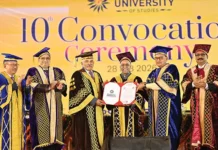[ Taku Stephen Tayu ]
Introduction
‘Loss of religion is loss of culture. Loss of culture is loss of identity.’ Come December, this slogan will be plastered along all the roadside walls and electricity and telephone poles of our state.
It is a very catchy slogan that attracts the attention of everyone. This slogan is also bound to create a guilty conscience in some of those who converted from their old tribal religion to another in the recent past. As I am one among them, I gave a serious thought to it, and I am putting down some of my thoughts on the matter. I am doing it for my own sake, in order to evaluate what I have done, when I converted from my ancestral religion to Christianity.
Change of religion vs loss of identity
There are many religions in the world. Most of these religions, with very large memberships, had a beginning at a definite time in history. We can trace their beginnings to a founder. Let us take the case of Buddhism, which is an example from our own country. The Buddha was a historical person. He lived in a definite point of time in history. He was a tribal like me, belonging to the Sakya clan in Nepal. He began a religious movement which today is called Buddhism.
It was a rebellious movement, led by a tribal prince, against the cast-ridden supremacy of Brahmanism. No one questions these historical facts. Those who became Buddhists at the time of the Buddha or after his death did change their religion. If we go by the slogan quoted above, the Buddha and his followers after him ‘lost’ their original religion, and consequently their ‘culture’, and along with that their ‘identity’. The 550 million Buddhists in the world today are without an ‘identity’ because they or their ancestors changed their religion.
There are about 2,00,000 Buddhists in Arunachal. They should also be branded as persons who lost their ‘culture’ and ‘identity’. I find these conclusions unacceptable.
What I said of Buddhism can be said of other religions also. Confucius lived shortly after the Buddha. There are about seven million persons in the world who follow Confucianism. To accept Confucianism, they had to abandon their original religion or way of life. Have they lost their identity? By the same argument, we cannot brand the followers of other world religions like Islam or Christianity as people who betrayed their ancestral religion and lost their identity.
If we look at the world population, we can say that the vast majority of people belong to one religion or the other which started at a particular moment of history. The original followers of these religions belonged to other religions or ways of life. Can we look at all these billions of people and say they have betrayed their original religion and lost their ‘culture’ and consequently are without any ‘identity’? My answer is no.
Culture and its components
Now let me look at this question from another angle. What is culture? Can culture be equated with religion, or is religion only one of the components of culture?
Culture is a complex reality. To learn more about culture, we turn to social scientists like cultural anthropologists. To learn more about religion, we turn to theologians. The study of culture and religion belong to two different streams of learning because they are two different social realities. They are not identical.
Whatever we predicate of culture cannot be predicated of religion. If they are identical, there should be no difference between the cultures of a Buddhist from Arunachal and a Buddhist from Sri Lanka. But we see that the culture of a Buddhist from Sri Lanka is a specific Sri Lankan culture and has much difference from the culture of a Buddhist from Arunachal. The equation of culture and religion is therefore not tenable.
At the same time, we notice certain commonalities in the way of thinking and behaviour among coreligionists in the world. This leads me to the conclusion that religion is a component of culture, though it cannot be equated with culture. Looking at culture closely, I find the following components in it. These are pointed out by Christopher Downs in his book Essays on Christianity in North-East India (pp 184-197).
Material component: The material component of a culture would be the way we build our houses or the way we cultivate our fields. Our culinary habits and the rules of hygiene we follow are also part of it. We could add similar activities to the list.
Aesthetic component: This consists of the types of music and dance a culture has.
The lyrics of the songs and their tunes, the carvings, and architectural style also form part of this aesthetic component.
Social component: This includes social customs related to marriage, family relationships, inheritance, celebration of feasts, etc.
Linguistic component: Language is another component of culture. Language is often called the vehicle of culture as language is used to express the way a person thinks.
Religious component: The religious component encompasses the concept of god, theories of creation, relationship with god, rituals that define and regulate the relationship to god, meaning of death, and beliefs of afterlife.
When we look at these various components of culture, we see that culture cannot be equated with any one of its components. Culture cannot be equated with religion; they are not congruent like two geometrical figures. Hence the statement, ‘Loss of religion is loss of culture’, does not stand.
Religious component of culture
I wish to look a little deeper into the religious component of culture. Religion itself has many components. It has an intellectual component which defines its concept of god and how the whole universe, including the nature and human beings and animals, relate with the deity. Theories on life after death are also part of this intellectual component of religion. Then there is the ritual component or mode of worship. These are words and symbolic actions performed by a person in order to express their relationship with the deity. These words and actions are taken from the other relevant components of the culture.
The intellectual component of religion will depend on the level of education of the believer. An illiterate man may attribute divine power to anything that is beyond his comprehension. For example, in the 8th century AD, some German tribes worshiped a big ‘sacred’ tree called ‘Thor’s Oak’. St Boniface cut it down to prove to them that the tree had no special power. They waited breathlessly for the deity to strike down Boniface. When nothing of that sort happened, they accepted Christianity. The perception of the Germans that the tree had divine powers was because of their ignorance and illiteracy. Therefore, as the intellectual standard of a person develops with education, his concept of god and other supernatural realities also change.
At the time when the Mesopotamian and the Egyptian world believed that heavenly bodies like the sun and the moon were divinities, the intellectual level of the people of Israel was sufficiently developed to believe that those heavenly bodies were objects created by god to give light. With the modern knowledge of astronomy, I also find it difficult to attribute divinity to any star, planet or moon. Astronomers tell us that that the sun will burn out one day. That will be the end of the earth and the moon. They cannot be divinities.
The conclusion I wish to draw from this is that, as the intellectual level of people belonging to a culture grows, their perceptions of religious realities also change. History shows that religious perceptions are not fossilized forever in the brains of the people. Even in Christianity, which has a well-developed system of theology, we have seen a steady development of understanding of the religion and reformulation of its theological perceptions in the last 20 centuries. In this context, I feel it is normal for tribal persons from Arunachal, as they get educated, to rethink the theological content of their religion. Such an exercise should not be construed as betraying or abandoning of their culture. It is to be seen as part of the normal development of a human being.
After changing the intellectual content of the traditional religion, a tribal is still free to use the words and symbolic actions of his culture to express his relationship with god according to his new theology. In other words, I as a Christian will continue to use the Nyishi language, art, architecture, music, dance and other symbolic gestures to give expression to my new religion. When I attend a traditional cultural celebration of my tribe, I will mentally reject the theological content of the religious component of that cultural festival, but I will have no problem with the material, aesthetic and social components of that festival. I will give much value to the bonding that is brought about among the members of a tribe through the social and aesthetic components of every cultural festival.
I must also add that some elements of the theological content of a cultural feast can be easily accepted by me. For example, most of the cultural festivals were begun to thank the deities for the good crops we received. I can use the occasion to thank my newly-found deity for the many good things he has given me. In that way, I make that festival my own thanksgiving festival. Thus, even changing the theological content of my old religion does not cut me away totally even from the religious component of my culture.
Change is the only constant
The Greek philosopher, Heraclitus, said, “Change is the only constant in life.” Culture, however sacred we consider it to be, is also subject to change. Change affects every component of culture. Let us look at its material component.
Over the years, we changed the way we construct our homes, the way we dress, the way we move. As for the aesthetic component, our music and dance, art and architecture underwent changes. Similarly, changes in marriage customs and inheritance laws are also observable on the social dimension of the culture.
Many tribal languages are on an irreversible path to extinction as the modern generation prefers to use English or Hindi as a more practical tool of communication. If change has affected every component of culture, why should only the religious component be left static?
I am reminded of a statement by Prof John Dewy, the famous teacher of Pandit Jawaharlal Nehru: “Every society gets encumbered with what is trivial, with dead wood from the past, and with what is positively perverse…. As a society becomes more enlightened, it realizes that it is responsible not to conserve and transmit the whole of its existing achievements, but only such as make for a better future society” (Democracy and Education, p 20).
It is a folly to worship the past. Our day-to-day life shows that we are moving on, discarding those elements of our culture that have no relevance in the modern society. In that process, we should not put barriers in the path of those who wish to change the intellectual content of their religious perceptions and move on to a system that, according to them, is more compatible with our present-day rational approach to realities.
Religion used as a political tool
If freedom of thought and freedom of conscience are the guiding principles of our polity, why should there be a conversion debate? The reason is not far to seek. Coreligionists sympathize with each other. Uniformity of religion helps to bring about consensus on many matters, especially in the sphere of politics.
Religion can unify people to make common political options. From time immemorial, unscrupulous rulers have used religion to galvanize their subjects to fight their political wars. Rulers found it easier to rule when all their subjects belonged to the same religion. The best example of it was Europe in the middle ages, when all were Christians under one pope. With the reformation, the scenario changed. The petty kings found it difficult when their subjects were divided between Catholics and the so-called Protestants. Hence, they devised the principle that the religion of the ruler should be the religion of the ruled (Cuius regio, eius religio).
In today’s era of electoral politics, the politicians know that the best way to attract votes is to polarize people on religious lines. Then they appeal for their votes after projecting themselves as patrons and saviours of their religion. Everyone knows that those who cry hoarse on behalf of a religion from a political platform have no religiosity in them. They may neither believe in god nor ever spend time in prayer. Their visits to temples and mosques are publicity stunts. They may be facing multiple criminal charges in the courts of law. Religion is only a political tool in their hands to come to power.
It is therefore important how many adherents there are of a religion, as every one of them is a potential vote. Consternation breaks out in their camps when some voters think it fit to exercise their freedom of conscience and choose to change their religion. Change of religion is interpreted as loss of votes. This is the genesis of the conversion debate.
Change of religion vs change of political parties
I see certain inconsistencies in the attitude of politicians towards the right of a person to freedom of conscience and his right to convert to a religion of his choice. While they deny the right of a person to change his religious affiliation, they uphold very vehemently the right of a person to change his political colour, and they even exercise this right several times over within the same calendar year.
I do not understand the logic of these double standards. One of the arguments they adduce in their favour is that most of those who change their religion are gullible tribal persons and they do it for some material benefit. The same argument should be applied to change in political parties, too. Moreover, who is to judge who is gullible and who is not? If a person is considered intelligent enough to vote a person to power, then he/she should be also intelligent enough to decide for himself/herself whether he/she should go to a temple, a mosque or a church. His/her decision as to who should rule the country has more consequences for the society than his/her decision to go a place of worship of their choice. The alleged gullibility of a tribal is exploited more by politicians than the promoters of any religion.
Conclusion
Our former prime minister, late Vajpayee, had called for a conversion debate after attacks on Christian institutions in the district of Dangs, in Gujarat, in 1999. It is my hope that the few lines I have written above will be a belated contribution to that never-ending debate.




